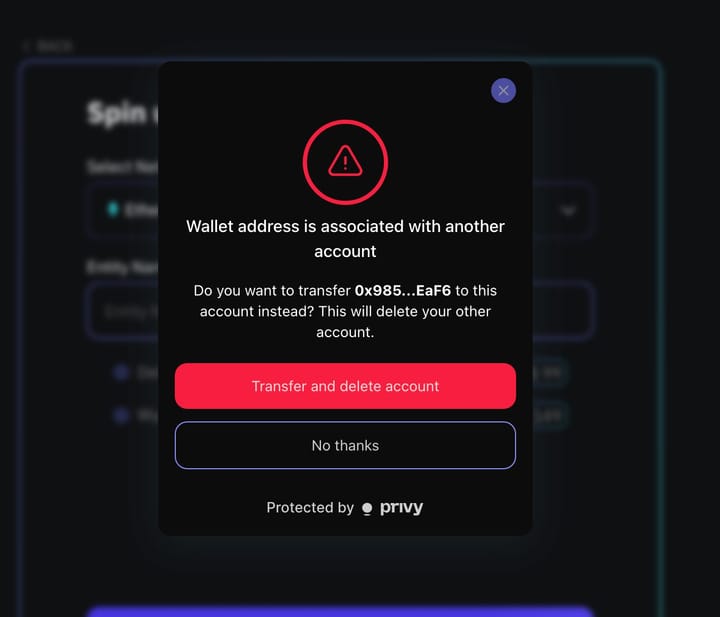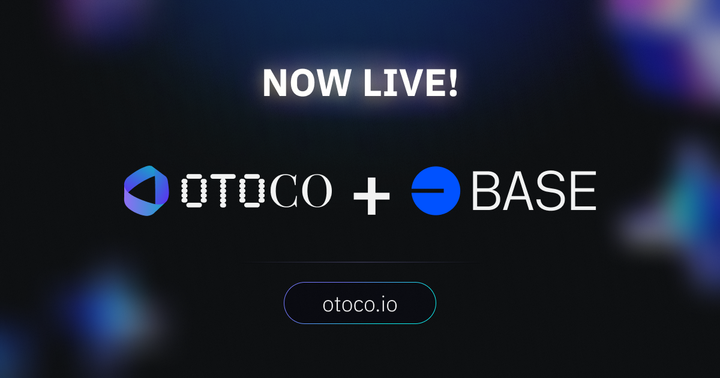From egg to organism: How to grow your DAO using OtoCo’s Onchain UNA/DUNA in Wyoming
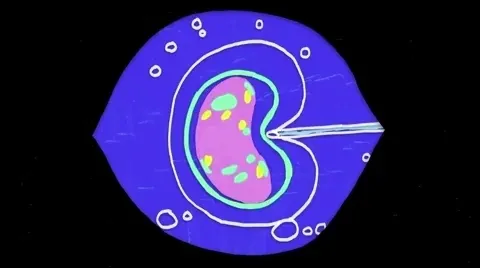
OtoCo goes live with its onchain Association in Wyoming
Today, OtoCo is adding the Wyoming Unincorporated Nonprofit Association (UNA) and Decentralized Unincorporated Nonprofit Association (DUNA) to its range of blockchain-native legal entities.
Our onchain UNA makes it possible for project leads to start out with an instant, low cost legal container for their project that can organically grow into a full-fledged DAO within the recognized legal structure of the Wyoming DUNA.
All it takes is a minimum of two wallets from anywhere around the world to cryptographically sign OtoCo's UNA/DUNA entity creation smart contract.
Decant your DAO
Decanting your DAO in an Association solves a number of challenges DAOs have traditionally faced:
- DAOs live in a legal nomansland: without legal persona, they can’t contract with third parties, appear in court, open a bank account, etc. They could access legacy services via a “legal extension” by owning an operating company such as an onchain OtoCo Series LLC, however proof of ownership of such LLC will be tenuous.
- DAOs do not benefit from limited liability, which means DAO token holders can be unlimitedly liable for the actions of the DAO and other token holders, who in the default legal analyses are considered Unlimited Partners in a Partnership.
- The tax status of DAOs is unclear, which can implicate investors and token holders alike.
To address the above issues, in March 2024 the state of Wyoming passed the Wyoming Decentralized Unincorporated Nonprofit Association Act (DUNAA), which took effect on July 1, 2024 and is meant for DAOs who are building public infrastructure to decant themselves into a recognized legal structure.
Wyoming has a long history of supporting innovative legal entity structures. It was the first state to adopt the limited liability company (LLC), the unincorporated nonprofit association (UNA), and even a subset of its LLC statute tailored for DAOs.
With the introduction of the DUNA, Wyoming continues to pave the way for decentralized organizations to operate with legal clarity.
The test tube: The Unincorporated Nonprofit Association (UNA)
Most projects will not be genuine DAOs from day one, in that they will have only one or two leads who start building the infrastructure layer and (at best!) use a SAFE multi-sig as the deployer wallet of their smart contracts.
By forming an association with at least two members around an agreed goal, leads immediately benefit from operating under limited liability, enter into contracts and - crucially - separate the project’s assets from their own (a distinction many builders in Web3 often fail to make!).
Such UNAs are widely used in the world e.g. by informal community groups like a local volunteer club or a neighborhood association, or by groups formed to advocate for a cause or organize charitable activities without formally registering.
The lack of formal registration is a key advantage of UNAs as they do not have to formally incorporate under state law: As long as it can be shown that two or more initial members agree to associate themselves around a common goal (typically by signing a UNA agreement, but consent can also be implied), an association is validly summoned.
Cell division from UNA into DUNA
The more recent DUNA in Wyoming builds on the UNA framework but is specifically designed to meet the unique needs of larger DAOs.
When a DAO surpasses 100 project token holders, it can elect to become a DUNA to fully decentralize its governance.
In doing so, the benefits of the UNA remain preserved but the project gains from further decentralization, which is particularly relevant in the context of the legal determination of its membership token as a security.
Claims that a member, in acquiring the project’s token, could have had a “reasonable expectation of profit primarily based upon the managerial efforts of others” (as per the third prong of the Howey Test in the U.S.) is sawed from under the chair of the SEC (punt intended!) on the basis that the DUNA does not have centralized managers and lack a statutory obligations to the maximize its profits.
In summary, and in combination with the favorable winds blowing in the direction of crypto under the new administration, the DUNA may be the first vehicle in the U.S. that is able to issue a token without such token automatically qualifying as a security, provided the DUNA’s setup is sufficiently decentralized.
OtoCo’s onchain UNA/DUNA
The absence of formal registration to summon an UNA under the laws of Wyoming, combined with legal wording in OtoCo’s UNA agreement that automatically converts an onchain UNA into a DUNA once the association grows beyond 100 members, allowed OtoCo to fully smart-contractify the creation of an UNA and its transformation into a DUNA, and make this process instant and low cost.
When summoning an UNA between two initial members on OtoCo, you can add the address of your project’s token. At that stage and continuously over the lifetime of your DAO, our protocol oracles your chosen blockchain for the number of token holders.
If the number exceeds 100, your UNA legally clicks into a DUNA under its initial UNA agreement. If for some reason your DUNA falls below 100 members, you convert back into an UNA.
At a later stage, this conversion from UNA to DUNA will be accompanied by additional governance wording and functionality to allow DAOs to fully manage their DUNA onchain, including organizing a vote.
Such DUNA Agreement (DUNAA) will specifically cater to projects such as public infrastructure protocols incl. L1, L2s etc. that seek to scale in a decentralized way while maintaining compliance and member protections. The DUNA ensures that DAOs can:
- Operate at scale while holding assets, signing contracts, and protecting members.
- Align with the decentralized ethos of blockchain-based projects.
- Avoid centralized management while ensuring legal clarity.
So as a rule of thumb:
- An UNA (<100 Members): Perfect for smaller DAOs or early-stage projects with simplified governance.
- A DUNA (>100 Members): Tailored for larger, decentralized organizations with governance token holders.
Make America BUIDL Again
OtoCo’s launch of its UNA/DUNA product coincides with what we see as a genuine Make America BUIDL Again (MABA) movement in crypto, which is leading to a repatriation of projects which previously would have used convoluted offshore structures, such as a Foundation.
Especially for projects with leads and/or token holders in the U.S., a Wyoming Association can do everything - and more - an offshore Foundation does: It can manage a crypto treasury, make grants, remunerate contributors, have for-profit subsidiaries (e.g LLCs on OtoCo!) and even issue a token in the U.S. without such token automatically qualifying as a security under the Howey test.
For foreign builders, using OtoCo to summon an UNA in Wyoming gives them an instant legal container for their project and a pathway to a compliant token issuance in the U.S., where previously they would have been forced to exclude the U.S. for their token distribution.
Key questions
Why should I summon an UNA or decant my DAO into a DUNA?
Incorporating as a UNA or DUNA offers significant advantages:
- Legal Recognition: Gain formal legal status, enabling your DAO to hold assets, enter contracts, and operate with confidence.
- Banking Access: Both an UNA and a DUNA can get a Tax ID / EIN issued by the IRS - letting them open bank accounts, pay taxes etc.
- Simplified Taxation: Like UNAs, DUNAs can choose to be taxed as corporations, avoiding the complexity of pass-through taxation and shielding individual members from disclosure requirements. They can also apply for IRS 501(c)(3) non-profit status and be exempt from taxation.
- Engagement and Compensation” Wyoming’s DUNA statute allows for reasonable compensation to members who contribute to the ecosystem. DAOs can reward governance participation or other contributions while maintaining nonprofit status.
- Decentralized Yet Compliant: DUNAs enable DAOs to stay true to their decentralized principles while offering clarity, legal protections, and operational flexibility.
What is the tax structure like for the UNA/DUNA?
Taxation for DAOs can be complex, but an UNA/DUNA setup help simplify this challenge.
Like LLCs and UNAs, DUNAs can opt for corporate tax treatment, which avoids the need for individual member disclosures and the complications of pass-through taxation—issues that often plague blockchain DAOs.
Corporate taxation also leverages the U.S.’s extensive network of tax treaties, providing clarity for DAOs with global members. While DAOs will still have tax obligations, paying taxes in the U.S. reduces uncertainty, protects members, and provides a clear framework for compliance.
This approach transforms a significant operational risk into a manageable reality for DAOs and will give investors more comfort to support your project.
If DUNAs are nonprofits, can they engage in for-profit activities?
Yes! A common misconception is that nonprofits cannot engage in for-profit activities. DUNAs, like UNAs, can absolutely operate for-profit ventures.
What they cannot do, in contrast with corporations, is make distributions or pay dividends to their members, but this is common to all association and foundation structures around the world.
The UNA/DUNA can however make grants, and Wyoming’s statute explicitly allows it to compensate members for their contributions. For example, DAOs can reward governance participation, token delegation, or other ecosystem activities.
Since DUNAs lack centralized management, rewarding member participation, including remuneration for an appointed administrator if so desired, is critical for sustaining growth.
How did OtoCo manage to put the UNA/DUNA onchain?
OtoCo engineered the process of creating a UNA/DUNA fully on-chain by the following steps:
- Wallet Connection: At least two members connect their wallets to OtoCo to create a UNA.
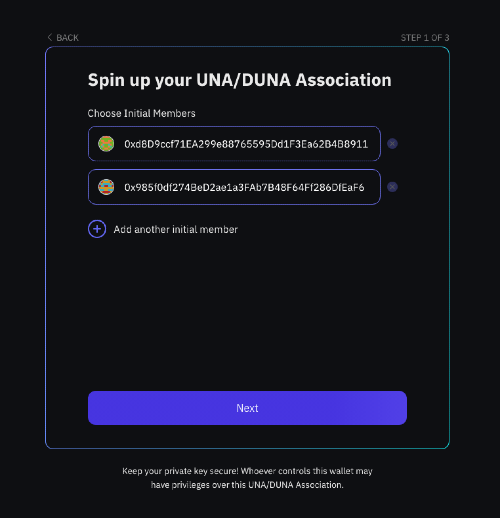
- Activation: Provide a physical address for your UNA. If you don’t have one, OtoCo offers a dedicated registered address.
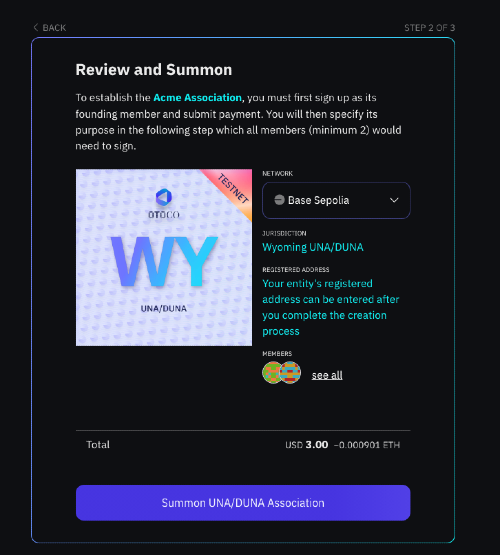
- Purpose and Governance: Define your UNA’s purpose and, if applicable, add a governance token (ERC20, ERC721, ERC1155, with more formats coming).
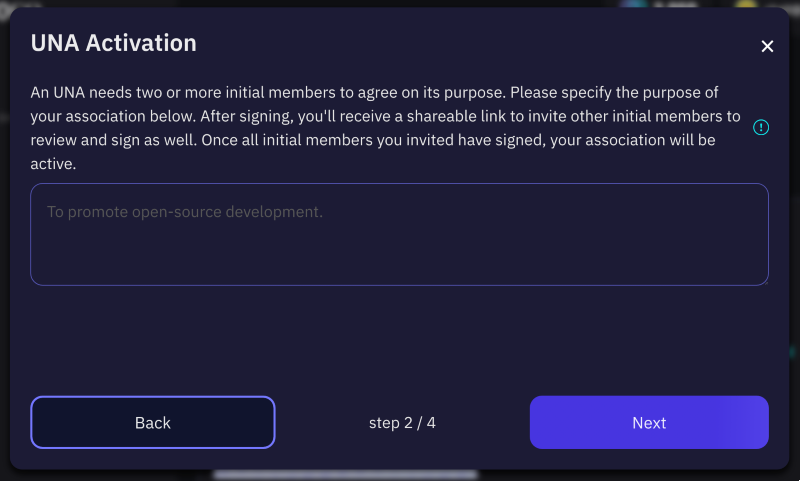
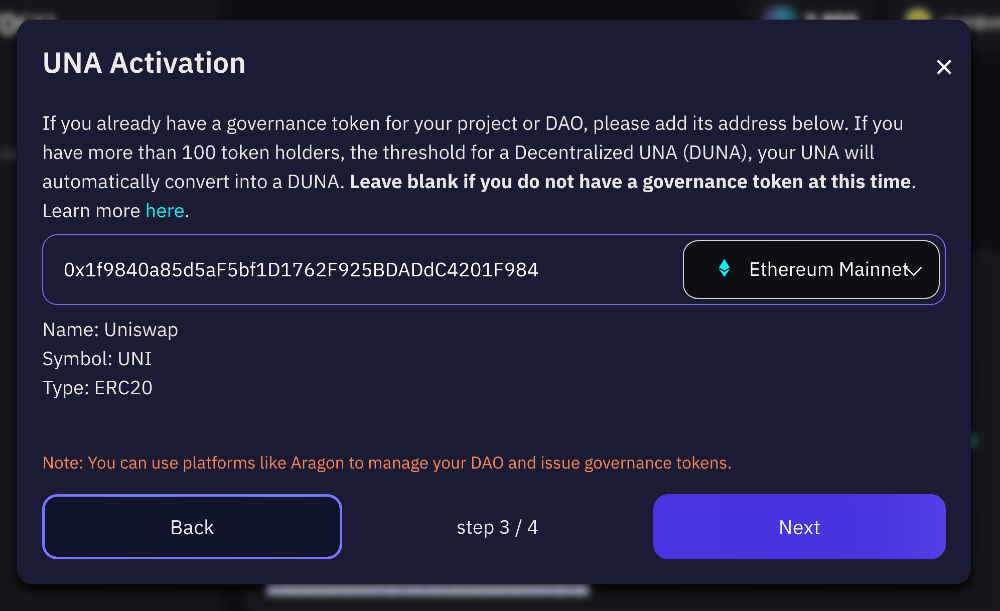
At what point does my UNA become a DUNA?
As mentioned earlier, once your governance token reaches 100 members, your UNA automatically clicks into a DUNA, with such conversions handled by OtoCo’s protocol and legal OS.
This process ensures scalability without additional administrative headaches, and automatically adopts the decentralized governance protocols of the DUNA.
Post-creation, all relevant documents, including your UNA/DUNA agreement together with all details of your UNA/DUNA entity are instantly available in your dashboard.
What does it cost to summon an UNA or DUNA on OtoCo?
The onchain UNA on OtoCo costs a one-time US$499 to summon and US$299 annually to maintain.
Until our launch period until 31 March, conversion into a DUNA will not incur an extra charge, with the recurring DUNA fee depending on the number of Members.
Further reading
Here are some helpful resources to dive deeper into UNAs and DUNAs:


